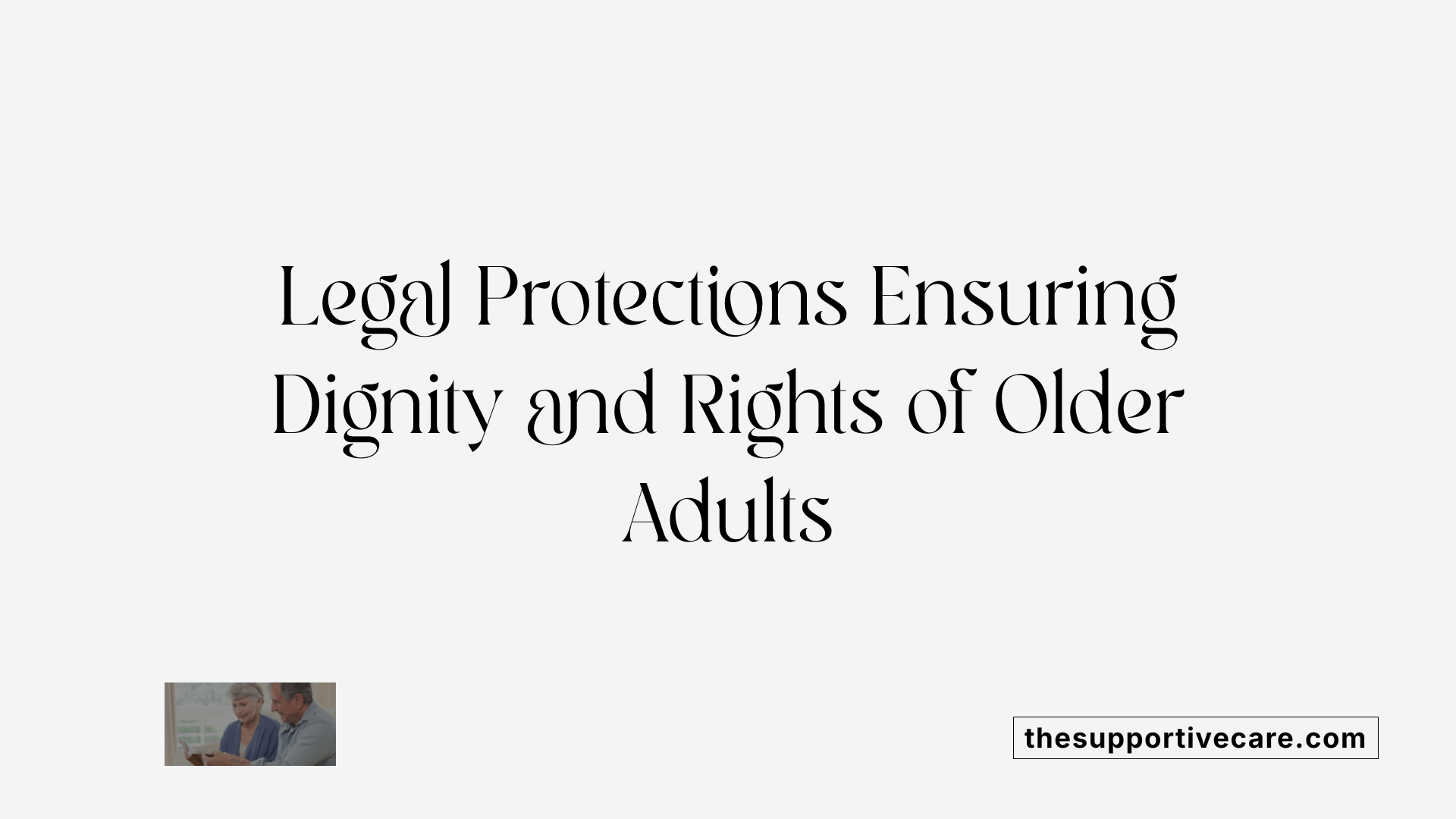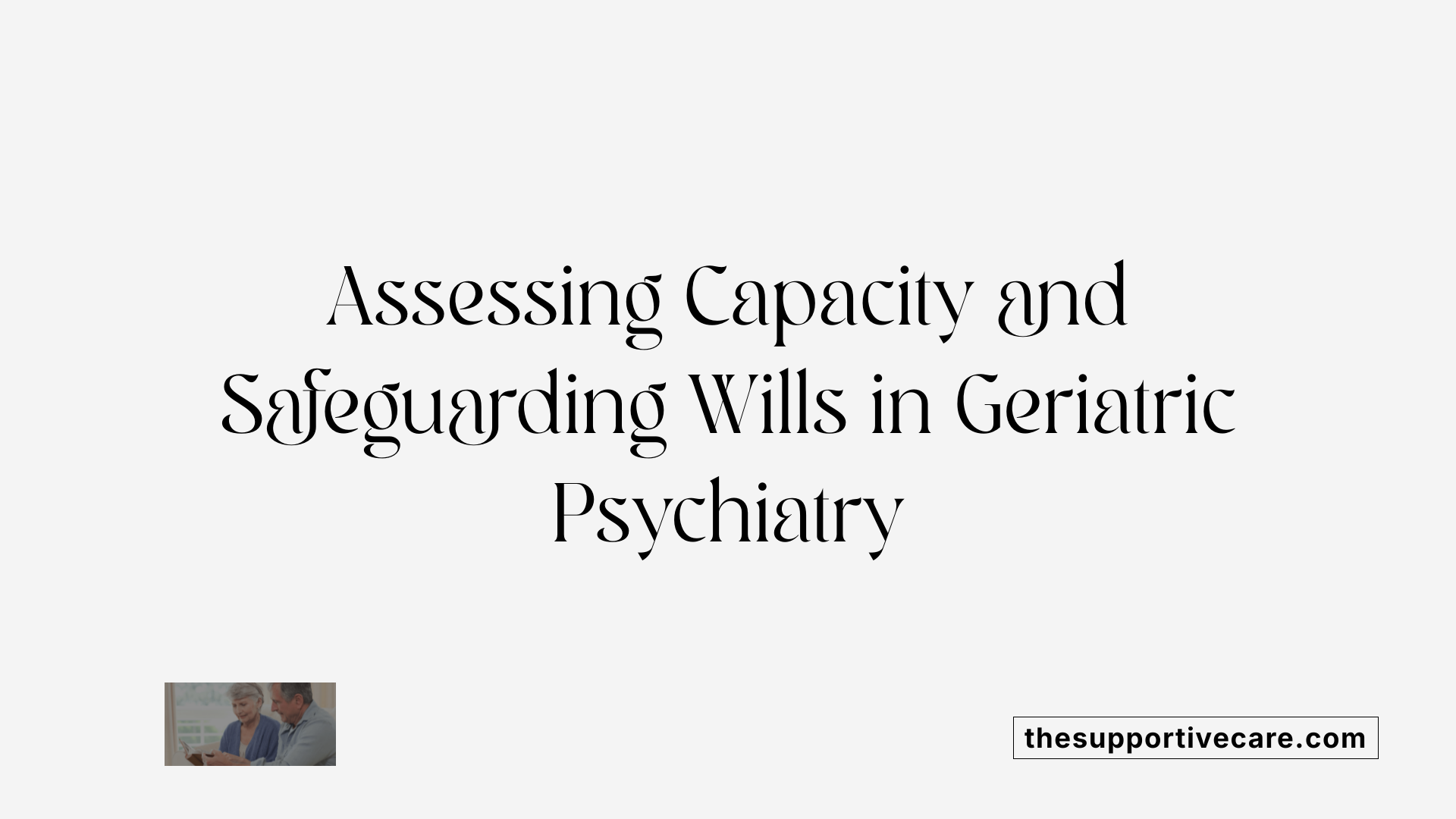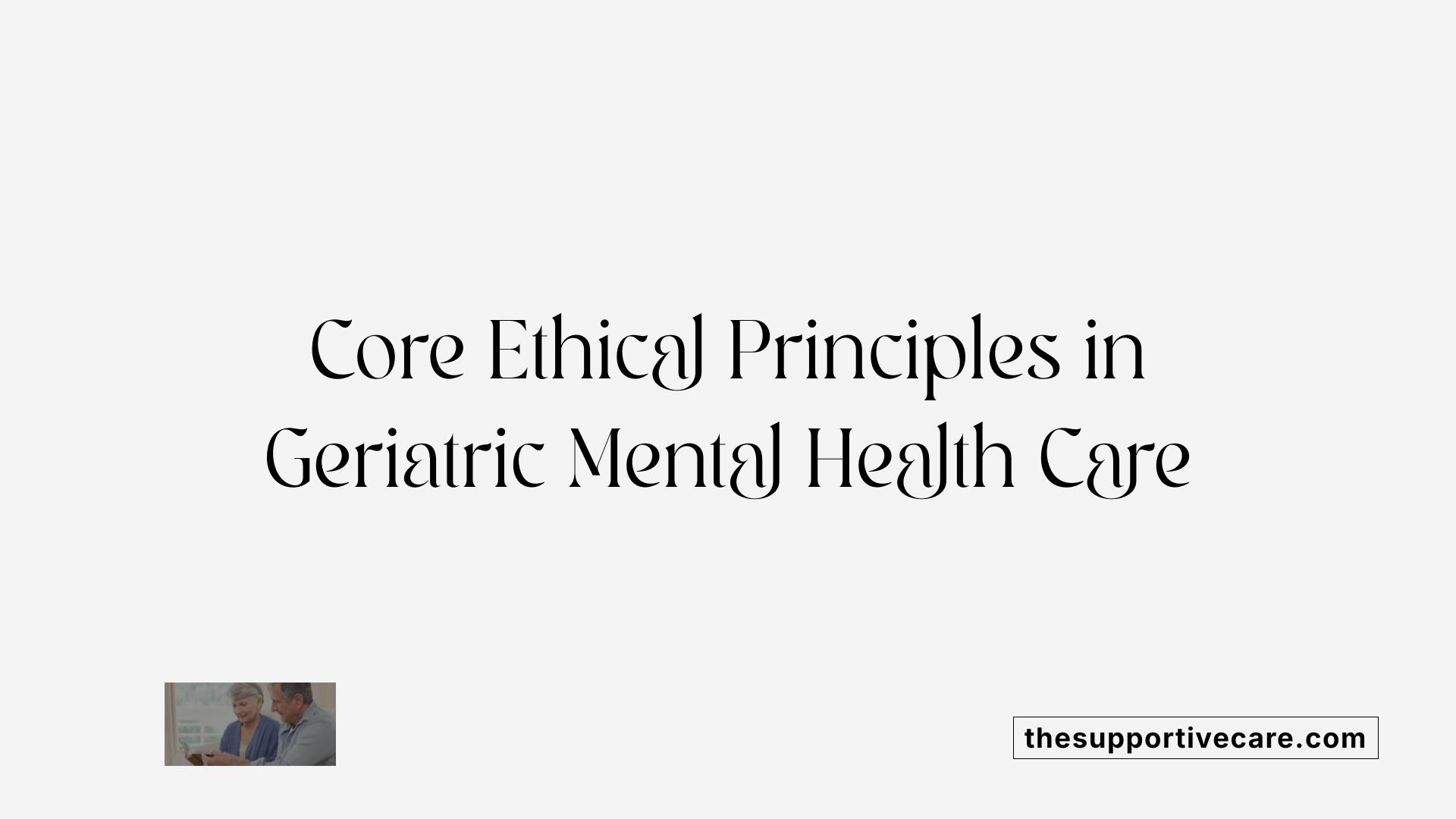Setting the Stage for Geriatric Behavioral Health
As the global population ages, the mental health needs and legal protections for older adults face unprecedented challenges. This article explores the intricate interplay of ethical principles, legal frameworks, and specialized treatment approaches essential to safeguarding and enhancing behavioral health in the geriatric population, particularly amidst rising substance use and psychiatric conditions.
The Demographic Shift and Its Impact on Geriatric Behavioral Health

What is the significance of the increasing older adult population in relation to mental health?
The global population of older adults, those aged 60 years and above, is growing rapidly, including in countries like India. This demographic shift carries important implications for mental health care. Older adults show a higher prevalence of chronic diseases alongside psychiatric disorders such as dementia, delirium, depression, anxiety, and substance use disorders.
As people live longer, the likelihood of developing mental health problems associated with aging increases, creating a pressing need for specialized behavioral health services that address these issues. The aging process often brings complex health challenges requiring integrated care approaches for physical and mental well-being.
The rise in older adult populations highlights the importance of developing tailored interventions, legal protections, and clinical practices that consider their unique vulnerabilities. This includes managing capacity assessments, preventing elder abuse, and providing support for conditions specifically prevalent in this age group.
In summary, the growing number of older adults globally underscores a critical demand for enhanced mental health services, protective legal frameworks, and ethical care practices to support their complex health and social needs.
Legal Frameworks Protecting Older Adults' Mental Health Rights

What key legal provisions exist to protect the mental health rights of older adults?
India has established several important legal frameworks aimed at safeguarding the mental health rights and dignity of older adults. The Mental Health Care Act, 2017 is a cornerstone legislation that offers comprehensive provisions for the assessment of mental capacity, treatment of psychiatric disorders, and safeguards such as nominated representatives and advanced directives. It also mandates the establishment of shelter and rehabilitation facilities specifically tailored for older adults with mental health needs.
Complementing this act is the Rights of Persons with Disabilities Act, 2016, which extends protections in areas such as legal guardianship and equal access to healthcare and social security benefits for older adults living with mental disabilities.
For familial protection and welfare, the Maintenance and Welfare of Parents and Senior Citizens Act, 2007 ensures that older adults receive appropriate support and maintenance from their children or relatives, protecting them from neglect and abuse.
The Indian Succession Act addresses legal issues surrounding testamentary capacity—a significant concern for older adults who may experience cognitive impairment or dementia. This law ensures valid execution of wills and requires periodic assessments to confirm mental competence.
How are older adults protected against abuse and neglect?
Older adults, especially those living alone, in residential care, or with limited activities of daily living, face elevated risks of elder abuse, neglect, and exploitation. Indian law incorporates stringent safeguards and mandates vigilance by healthcare providers and legal entities to intervene appropriately. These provisions help protect property rights, personal safety, and offer avenues for legal recourse and guardianship when necessary.
Together, these acts and legal measures form a robust framework protecting the mental health rights of older adults in India, ensuring their autonomy, safety, and well-being within society and healthcare systems.
Decisional Capacity and Testamentary Issues in Geriatric Psychiatry

How is decisional capacity evaluated among older adults, particularly in legal contexts?
Evaluating decisional capacity in older adults requires a careful, task-specific approach. This means that assessments focus on particular decisions, such as consenting to medical treatment, managing finances, or making a will. Capacity is not a global judgment but varies depending on the complexity and nature of each decision.
Impact of cognitive impairment and dementia on capacity
Cognitive impairments, such as those caused by dementia, significantly affect an elderly person's ability to understand, appreciate, and reason about decisions. However, the presence of a psychiatric diagnosis alone does not automatically imply incapacity. Capacity evaluations must consider fluctuations and individual capabilities, ensuring that diminished cognitive function does not unjustly strip older adults of their autonomy.
Task-specific, systematic capacity evaluations
The evaluation process is structured and systematic, designed to assess whether the individual can understand relevant information, appreciate consequences, reason logically, and communicate choices. This approach helps protect older adults by identifying when assistance or legal protections are necessary without overreaching.
Legal significance of testamentary capacity and periodic assessments
Testamentary capacity—the ability to make a valid will—is especially sensitive in geriatric psychiatry. Dementia and cognitive decline may impair this capacity, leading to legal disputes or exploitation. Periodic assessments are important to ensure that wills and other testamentary documents truly reflect the older adult's informed intent and mental status.
| Aspect | Description | Importance |
|---|---|---|
| Decisional Capacity | Ability to make informed, reasoned decisions on specific tasks | Ensures autonomy while protecting from harm |
| Impact of Cognitive Decline | Dementia can fluctuate, requiring careful evaluation rather than assuming incapacity | Prevents unjust deprivation of autonomy |
| Systematic Evaluation | Task-specific, structured approach assessing understanding, reasoning, communication | Provides reliable, legally defensible assessment |
| Testamentary Capacity | Capacity to make valid wills, affected by cognitive status | Protects against elder exploitation and invalid legal documents |
This thorough, case-by-case evaluative process plays a crucial role in safeguarding older adults’ rights and well-being within medical and legal frameworks.
Ethical Principles Guiding Geriatric Behavioral Health Care

What ethical principles underpin decision-making in geriatric behavioral health?
The ethical foundation in geriatric behavioral health care is based on four main principles: respect for autonomy, beneficence, non-maleficence, and justice. Respect for autonomy involves honoring the older adult's right to make informed decisions about their care whenever possible. Beneficence and non-maleficence require healthcare providers to act in ways that benefit patients while avoiding harm. Justice emphasizes fairness in the distribution of resources and treatment.
Balancing Autonomy with Safety in Fluctuating Capacity
Older adults often experience fluctuating decisional capacity, especially when psychiatric conditions like dementia or delirium are present. In such cases, healthcare providers must delicately balance respecting autonomy with protecting patients from harm. This balance involves conducting systematic, task-specific capacity assessments and considering family or proxy involvement without overriding patient dignity.
Approaches to End-of-Life Care and Withdrawal of Life Support
End-of-life decisions demand careful ethical scrutiny. Providers should honor patient preferences and advanced directives, weighing beneficence and non-maleficence when considering withdrawal of life support. Maintaining dignity and comfort for the patient is paramount during these sensitive stages.
Use of Restraints and Dignity Considerations
Use of physical or chemical restraints must be a last resort, applied only after considering the patient's safety and dignity. Ethical care requires that restraints be used minimally, safely, and with continuous monitoring, aligning with respect for the individual's rights and well-being.
These ethical principles ensure that geriatric mental health care respects elderly individuals as persons with unique needs while providing protective oversight when vulnerabilities arise.
Comprehensive Treatment Services for Substance Abuse and Mental Health in Older Adults
What comprehensive treatment services are available for substance abuse and mental health issues?
Comprehensive treatment for substance abuse and mental health disorders offers a spectrum of services tailored to meet individual needs, including special considerations for older adults. These services include thorough medical and psychiatric assessments to understand the scope of substance use and co-occurring disorders.
Detoxification programs provide a medically supervised process to safely manage withdrawal symptoms. Following detox, both inpatient and outpatient psychotherapy options are available, such as individual counseling and group therapy, focusing on behavioral interventions and coping strategies.
Medication-assisted treatment (MAT) plays a vital role, especially for opioid and alcohol use disorders, utilizing medications like naltrexone to reduce cravings. These pharmaceutical options are combined with psychosocial support to optimize recovery.
Treatment settings are diverse:
- Inpatient Programs: Provide intensive care and 24-hour support, ideal for severe cases or when medical complications arise.
- Outpatient Services: Allow patients to maintain daily routines while receiving therapy and medication management.
- Community Supports: Include peer groups, shelter, rehabilitation facilities, and home-based interventions, crucial for older adults who may face mobility challenges or social isolation.
Special considerations for older adults involve adjustments for cognitive impairments, physical health issues, and medication sensitivities. Assessments of decisional capacity guide consent and treatment adherence.
Coordination of care with social workers, nurses, and counselors ensures that ethical principles such as respect for autonomy and beneficence guide service delivery.
Overall, an integrated approach combining medication, psychotherapy, and supportive services arranged within suitable settings promotes effective treatment engagement and sustained recovery for older adults grappling with substance use and mental health disorders.
Addressing Various Forms of Addiction Through Tailored Treatment Programs
How do treatment programs address various forms of addiction?
Effective addiction treatment programs recognize that substance use disorders (SUDs) present differently across individuals, requiring personalized approaches. These programs incorporate evidence-based therapies tailored to the specific substances involved, such as alcohol, opioids, cannabis, or stimulants, as well as the individual's mental health needs.
Personalized treatment approaches for different substance types
Treatment strategies are adapted based on the substance profile and severity of use. For instance, opioid use disorder often involves medication-assisted treatment (MAT) with medications like buprenorphine or naltrexone, which help reduce cravings and withdrawal. Alcohol use disorder may also be treated with pharmacotherapy combined with psychosocial support.
Use of cognitive-behavioral therapy, motivational interviewing, and dialectical behavior therapy
Psychotherapeutic interventions form the backbone of addiction treatment. Cognitive-behavioral therapy (CBT) helps individuals recognize and change maladaptive thought and behavior patterns linked to substance use. Motivational interviewing (MI) enhances readiness for change by exploring ambivalence. Dialectical behavior therapy (DBT) is particularly useful for clients with co-occurring emotional regulation difficulties.
Medication-assisted treatment and peer support
MAT improves treatment retention and outcomes by addressing physiological dependence. Coupled with peer support groups, including 12-step programs and recovery coaching, MAT fosters a holistic recovery environment that attends to both medical and psychosocial dimensions.
Family involvement and relapse prevention strategies
Integrating family in treatment encourages a supportive home environment and addresses dynamics that can influence relapse. Relapse prevention focuses on developing coping skills to handle triggers and high-risk situations, promoting sustained recovery.
These multifaceted, individualized treatment plans are vital in managing the complex and varied nature of substance use disorders, improving prognosis and quality of life for individuals battling addiction.
The Growing Challenge of Substance Use Disorders Among Older Adults
Increased Prevalence of Alcohol and Prescription Drug Misuse in Elders
Substance use disorders (SUDs) are increasingly common among older adults, with rates of alcohol and prescription drug misuse higher than in previous generations. For example, in 2015, about 2.3% of adults over 65 met criteria for alcohol use disorder within the past year, and a lifetime prevalence stood around 13.4%. Additionally, approximately 25% of older adults are prescribed potentially addictive psychoactive medications such as benzodiazepines and sedative/hypnotics.
Barriers to Recognition and Treatment Due to Stigma and Misconceptions
SUDs among older adults remain underrecognized and undertreated. Factors driving this include stigma attached to substance misuse, denial by the patients themselves, reluctance to seek help, and misconceptions held by healthcare providers that substance use problems are less likely or less severe in this age group.
Biomedical Aging and Pharmacological Interactions Increasing Risks
Biomedical changes related to aging accelerate physiologic decline, which amplifies the negative health effects from substance use. Drug metabolism, sensitivity to medications, and risks for adverse interactions increase, particularly with concurrent use of alcohol and psychoactive prescriptions. These factors substantially raise morbidity and mortality risks in older patients with SUDs.
Importance of Screening and Early Intervention
Given these challenges, proactive screening and early intervention are vital. Early detection allows for timely treatment tailored to the complex needs of elderly patients, helping to mitigate health complications and improve outcomes. Comprehensive assessments should address both substance use and age-related health factors, promoting safer medication management and addiction support.
What challenges exist in addressing substance use disorders among older adults?
Substance use disorders in older adults are often underrecognized due to stigma, denial, and provider misconceptions. Age-related physiological changes exacerbate risks from alcohol and prescription drug misuse, making early screening, intervention, and tailored treatment essential for this vulnerable group.
Legal and Ethical Considerations in Involuntary Treatment and Commitment
What are the legal and ethical issues surrounding involuntary treatment for substance use disorders?
Involuntary treatment for substance use disorders (SUDs) involves complex legal and ethical challenges. Laws like Washington State’s Ricky’s Law (2018) enable courts to order involuntary commitment of individuals with SUDs, aiming to provide treatment when individuals are unable or unwilling to seek help voluntarily. Kentucky’s Casey’s Law (2018) adds a unique aspect by requiring a financial pledge to cover treatment costs as part of the petition process.
A foundational legal principle in these cases is the standard of "clear and convincing evidence." This means a judge must find substantial proof that involuntary treatment is necessary, balancing the need to protect individuals and society while respecting patient autonomy. This standard was firmly established in the landmark Supreme Court case Addington v Texas (1979), which clarified evidentiary requirements for civil commitments.
Ethically, involuntary commitment raises dilemmas between respecting the autonomy of individuals and safeguarding their well-being (beneficence). Patients with SUDs may lack insight into their condition, leading to concerns about their capacity to make informed decisions. In such contexts, courts and healthcare providers must carefully weigh the benefits of treatment against the infringement on personal liberty.
Supreme Court rulings provide additional context to these issues. For instance, Powell v Texas (1968) upheld the constitutionality of criminalizing public intoxication, emphasizing public safety concerns while acknowledging limitations on punishing substance use itself. This precedent influences how states regulate behavior related to SUD and supports the use of legal means to reduce harm.
In summary, involuntary treatment laws for SUDs use clear legal standards to justify commitment while navigating ethical tensions between autonomy and beneficence. Judicial oversight ensures protections against arbitrary deprivation of liberty, guided by Supreme Court decisions that balance individual rights with public health.
Confidentiality and Ethical Practice in Substance Use Treatment
How are confidentiality and ethical practice maintained in substance use treatment?
Confidentiality in substance use treatment is strongly protected by legal provisions such as 42 CFR Part 2, which restricts disclosure of patient information to safeguard privacy. This law ensures that records related to substance use disorders are treated with high confidentiality unless there is a compelling reason to override privacy, such as a duty to warn or protect others from imminent harm.
However, confidentiality is not absolute. Exceptions arise when counselors face ethical dilemmas that require reporting to prevent harm, such as protecting vulnerable individuals or public safety. Balancing patient privacy with these legal and ethical limits is a critical aspect of professional practice.
Counselors working in addiction treatment hold several ethical responsibilities. They must maintain competence by practicing within the scope defined by their education, training, and certification. When cases exceed their expertise, referrals to specialists are necessary to ensure clients receive optimal care.
Maintaining appropriate boundaries is also essential. Counselors avoid dual relationships and disclose personal information solely when it benefits treatment. Sexual involvement with clients is strictly prohibited to uphold professional integrity.
In addition, informed consent plays a pivotal role. Clients should be fully informed about treatment options, risks, benefits, and related financial obligations, fostering transparency and respect for client autonomy.
Supervision and consultation serve as vital support mechanisms for counselors. They provide opportunities for guidance, especially when employing new techniques or encountering challenging clinical scenarios, thereby enhancing ethical and effective practice.
Cultural competence is equally important; counselors must honor diverse values and backgrounds, creating a therapeutic environment that respects client autonomy and promotes recovery.
Through adherence to these legal protections and ethical standards, substance use treatment professionals ensure confidentiality, uphold patient dignity, and provide responsible, client-centered care.
The Role of Healthcare Providers in Advocating for Older Adult Patients
Nurse and Social Worker Responsibilities in Mental Health Care
Nurses and social workers play crucial roles in advocating for older adults with behavioral health concerns. Nurses are responsible for promoting and protecting patient rights, ensuring safety, and providing treatment that aligns with established standards of care. Social workers address both mental health and social aspects, offering support across diverse settings such as hospitals, community centers, and care facilities.
Promotion and Protection of Patient Rights, Safety, and Standards of Care
Healthcare professionals must adhere strictly to patient rights frameworks, including those outlined in the Mental Health Care Act and Patient Self-Determination Act, which emphasize informed consent and autonomy. Protecting older adults from abuse, neglect, and exploitation is vital, requiring vigilance and legal awareness among providers. Maintaining confidentiality and ethical practice is a priority, as is ensuring appropriate interventions tailored to elderly patients’ fluctuating capacities.
Importance of Interdisciplinary Collaboration and Ongoing Professional Development
Effective care demands interdisciplinary collaboration among nurses, social workers, physicians, and counselors. Continuous education enables providers to stay current with evolving regulations and treatment approaches for complex cases involving cognitive issues and co-occurring disorders. Regular supervision and training support ethical practice and competence.
Addressing Co-occurring Disorders Through Integrated Treatment
Older adults often experience overlapping psychiatric and substance use disorders. Nurses and social workers employ integrated evidence-informed interventions to manage these complexities, emphasizing harm reduction and personalized care plans. This approach improves outcomes by acknowledging the biological, psychological, and social facets of aging and mental health.
| Role | Responsibilities | Impact on Older Adults |
|---|---|---|
| Nurses | Advocate patient rights, maintain safety, adhere to standards | Provides safe, respectful care; prevents abuse |
| Social Workers | Address social and mental health needs; promote integrated treatment | Supports holistic well-being across care settings |
| Interdisciplinary Teams | Collaborate across professions, share knowledge | Enhances comprehensive care tailored to complex needs |
| Continuous Education | Stay updated on laws and best practices | Ensures ethical treatment aligned with current standards |
Embracing Holistic, Legal, and Ethical Frameworks for Geriatric Behavioral Health
As the elderly population grows, so do the complexities of managing behavioral health, intertwining legal, ethical, and clinical dimensions. Ensuring dignity, autonomy, and safety requires vigilant legal protections and robust ethical guidelines. Integrated, evidence-based treatments tailored to older adults’ unique needs, combined with vigilant capacity assessments and interdisciplinary collaboration, form the cornerstone of compassionate and effective care. Sustained attention to confidentiality, advocacy, and respect for patient values will remain essential as our society navigates the future of geriatric behavioral health.
References
- Interface of Law and Psychiatric Problems in the Elderly
- Chapter 5 Legal and Ethical Considerations in Mental ...
- Ethical and Legal Aspects of Substance Use Disorder ...
- Ethical and Legal Issues in Geriatric Psychiatry
- Statutes, Regulations, and Guidelines
- NASW Standards for Social Work Practice with Clients ...
- Substance Use Among Older Adults: Ethical Issues | Focus



































































































